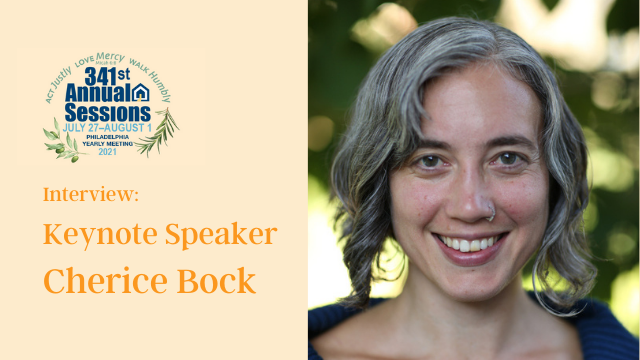
Cherice Bock is our Keynote speaker for Saturday, July 31st at 4:30 PM. She lives in Oregon and is an adjunct professor of ecotheology at Portland Seminary. Cherice serves as the Creation Justice Advocate at Ecumenical Ministries of Oregon. She holds an M.Div. from Princeton Theological Seminary and an M.S. in environmental studies from Antioch University New England. She is a Ph.D. candidate in environmental studies at Antioch University New England.
Cherice is an editor of Barclay Press’s Illuminate (Bible study curriculum written by Friends, for Friends). She also edits the environmental studies journal Whole Terrain as well as curates web content for the watershed discipleship website. As a recorded Quaker minister, Bock sees environmental concerns as one of this generation’s most important social justice issues.
In the interview below she shares some of her thinking around this important issue and its relationship with her faith.
Q: As a Quaker minister and an environmental justice advocate, have you ever had difficulty balancing the pressures or driving forces of these two concerns?
I feel like supporting environmental justice is directly in line with Quaker tradition, although we have not clearly articulated it as such. There is no conflict between Quakerism and environmental justice. There is definitely sometimes a conflict in the sense that I want to speak truth in love to our denomination (and others), and I get impatient. I want us to respond more actively and radically to the Spirit’s calling as a community.
Sometimes it is challenging to balance the prophetic and urgent nature of my ministry with an attitude that encourages people to connect rather than draw away in fear or shame. Building a community based in trust and care is the basis for any communal and Spirit-led action, and ultimately would release us from the fear we naturally have when looking at the climate emergency and all its intersecting justice concerns. I try to focus on that slow work while also catalyzing people toward immediate action.
Q: Knowing the human heart as a Minister, and the need for connection people have, how can faith be used resolve divisions? Are there situations where it can’t work?
The Spirit can connect our hearts when we open them with true vulnerability and willingness to be taught and transformed. Where this gets challenging is when one person or “side” opens their hearts to transformation, learning, and care, and the other person or “side” does not. If there are “sides,” we must always be on the side of those with less power, those who are being oppressed, and work together to reject oppression and enact liberation.
As Friends, we can sometimes get distracted by trying to resolve differences via compromise and listening to all “sides,” when one side is advocating for themselves to be treated as human beings and the other side is trying to cause harm. When we compromise in such situations, liberation cannot happen. Friends who have power for one reason or another (our race, gender, sexual orientation, citizenship status, etc.) have to constantly query ourselves and allow the Spirit to query us about who benefits from resolutions to conflict we’re advocating.
(Then there is) socio-economic (power) or class, which I think is at least as important as many of the others just mentioned.
Q: When you dream for the future, what is closest to your heart’s wish? Is that different from your mind’s wish?
I don’t think my heart and mind wish for different things. I think Friends have often fallen into a dualistic understanding of our spirit and/or mind being something separate from our heart or our bodies, and we try to escape our emotions and bodies toward a more rational and spiritual experience through waiting worship, ignoring our bodies and focusing solely on the spiritual plane.
So, part of my wish would be for a fully embodied Quakerism, where our spirituality is not disembodied but is fully present and active in our world, senses, emotions, and relationships. My dream is for the Beloved Community, including the community of all life–for humanity to re-member ourselves, to become members again of the community of creation, a collaborative community in which we all give and receive what we need, recognizing the Spirit at work in the dynamic relatedness we have to this world in which we are embedded.
My dream would be for a world in which we enact care with fullness and joy, knowing we also will be cared for, knowing we each belong and are valued and loved.
Q: Have your studies informed who you are today? If so. what teacher, course, book, or media, has been the driver behind your wish to lift up the environmental advocacy?
Robert Bullard‘s research on the connections between environmental concerns and racism was really important to me as I realized environmental justice and climate justice are not equally distributed across the human population. Bullard collaborated with the United Church of Christ to perform his research and share his findings, so I was encouraged that faith communities can play an important role in the work toward a more just and sustainable future. Paolo Freire and Gustavo Gutiérrez were important to me as I started to learn about liberation theology and pedagogy, as well as James Cone, and I learned and grew much through reading bell hooks on critical pedagogy. I started learning about ecotheology through Sallie McFague. As I learned more, I have learned much from those who are discussing imperialism and decolonization. I’ve been influenced particularly by Ched Myers and Elaine Enns in their work on anti-imperial interpretations of the Bible and theology, culminating in watershed discipleship and their recent book Healing Haunted Histories. This is helpful for me as a white person from a peace church (they’re white Mennonites) to figure out how to take steps on this journey toward a more holistic understanding of myself and my faith in relation to people, God, and the rest of creation.